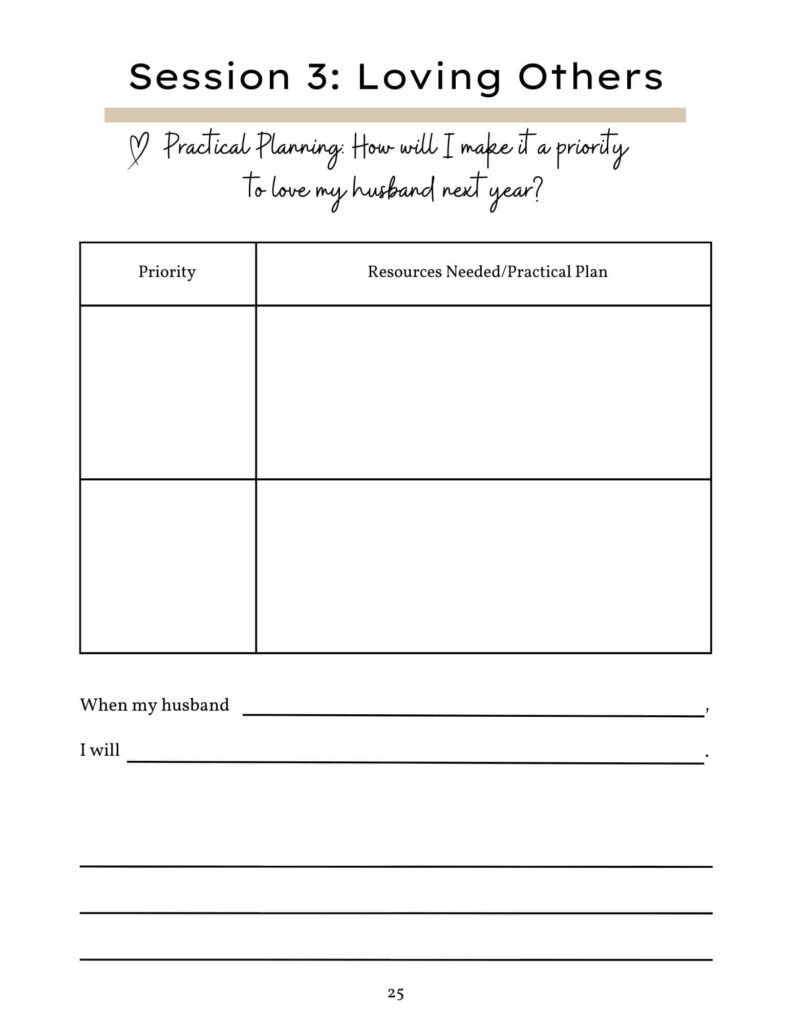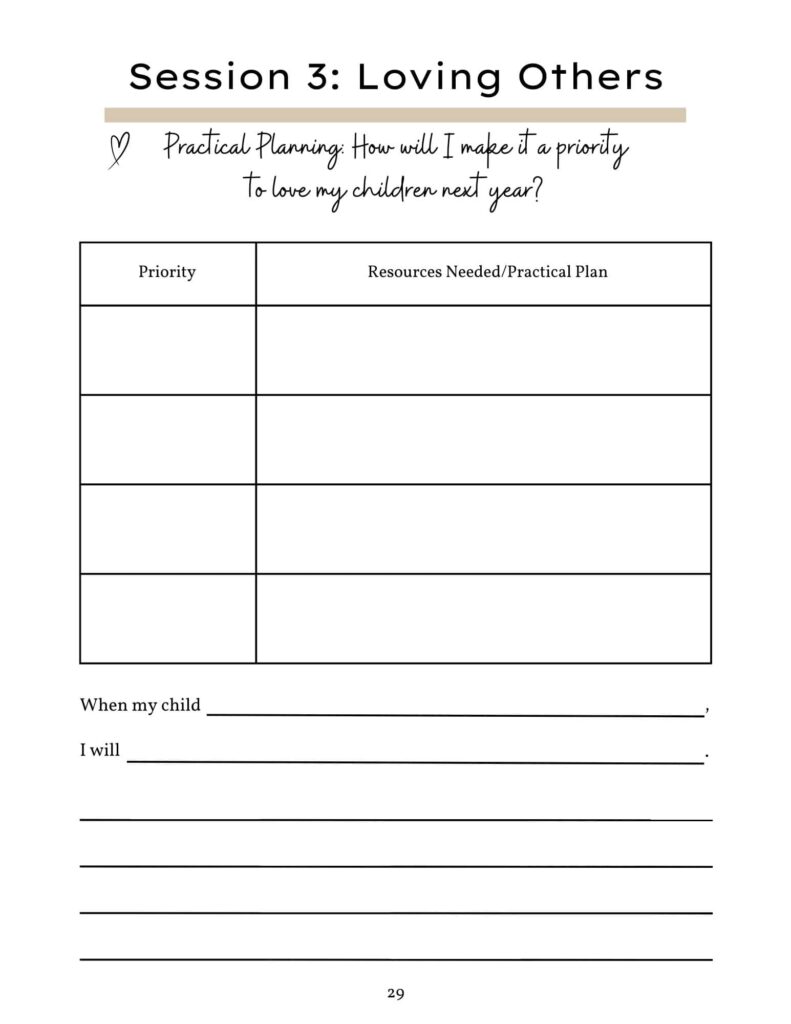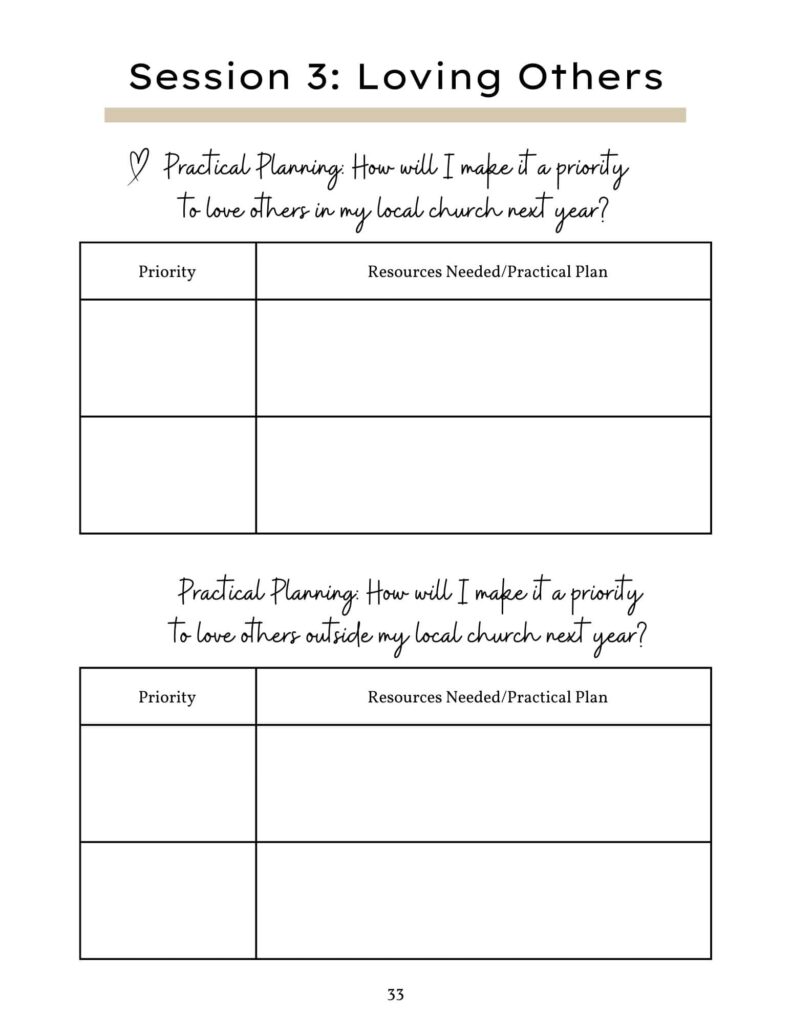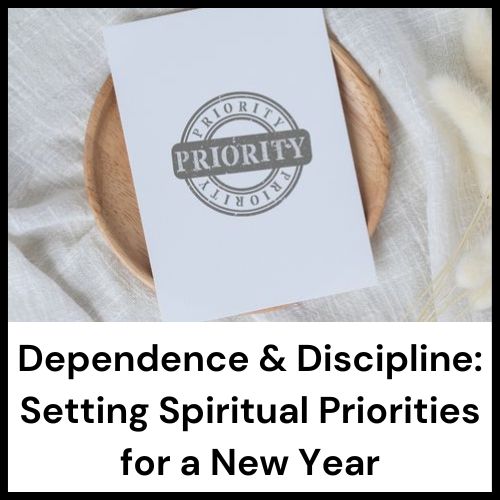Suggestions for Discipline in Loving Others
You would likely agree that people are more important than things. And that relationships matter more than tasks. But in practical terms, it can be hard to prioritize loving our families, our church family, our neighbors, and others, when our days are consumed by getting through the things and tasks that seem to require our immediate attention.
I want to share some practical ideas for how you can make it a priority to love those around you as an overflow of the love you experience in relationship with God. It takes intentionality to prioritize the people in our lives over our endless to-do list or endlessly available distractions.


Dependence and Discipline in Spiritual Habits
This article is the third in a series of articles intended to help you think deeply about spiritual priorities. For an introduction to what God tells us he wants us to prioritize, read “Dependence and Discipline: Setting Spiritual Priorities for a New Year.”
Other Articles in This Series
In this series of articles, we’re talking through three things we see in scripture that God wants us to prioritize.
The first priority comes from what Jesus called the greatest commandment—to love God.
Love the Lord your God with all your heart and with all your soul and with all your mind.
Matthew 22:37
To love God we must know Him, and that means prioritizing reading His word and prayer.
The second priority comes from the emphasis throughout scripture on loving others. John 13:34 tells us to love one another, 1 John 4:8 says that “anyone who does not love does not know God, because God is love,” and we could quote many more Bible verses that address this topic.
We love because he first loved us.
1 John 4:19
That’s what we’re going to focus on now—practical ways we can love others.
Spiritual Reality Check
Our ability to love others in the sacrificial way that we see called for in scripture is directly tied to our understanding and experience of God’s deep love for us. We’re going to look at specific ways you can love your husband, your children, your local church, and others outside those intimate groups.
Make It a Spiritual Priority to Love Your Husband
Take a moment to reflect on whether you are prioritizing your relationship with your husband. Here are a few questions that might help.
- Does he feel secure in my love for him?
- Do I know what matters to him and makes him feel content in our marriage?
- Am I considering his needs, wants, and feelings as I make decisions about how I spend time, energy, and money?
- Do we talk about anything outside of the day-to-day needs of maintaining the household?
Do you struggle more with dependence on God—obeying God’s call to love even when it’s hard—or discipline—setting aside time to love my husband in practical ways?
Ways You Can Prioritize Loving Your Husband
There are many ways you can show love to your husband. You may have heard of love languages. Gary Chapman wrote a book about five different ways people feel and receive love. If you’re really stuck in knowing where to start, you could ask your husband to take the love languages quiz and see what areas are particularly meaningful for him. Before you move on, pray about this issue. Ask God to help you come up with creative ideas to change this area of your life.
Think about whether any of the following general ideas would effectively demonstrate love to your husband:
- kind and affirming words
- acts of service for him (go out of your way to do a household task that is normally “his”)
- physical touch/closeness
- quality time together
- thoughtful gifts
- date nights
- service/volunteer projects together
- join him in doing something he enjoys
- one-on-one conversation
- reduce or eliminate a specific behavior that bothers him
- pray for him
Now, think about some specific ways to implement these ideas. These are just a few suggestions to begin your brainstorming process.
- make a list of date night ideas
- brainstorm activities to do together
- go with him on a business trip
- cook together
- watch a TV series together once a week
- serve in ministry together
- thank him for something every day (write down things as they come to mind either on your phone or in a notebook)
- help him with a household project
- make an effort to do something he has always wanted to do
- get a list of conversation starters to use
- focus on curbing negative behaviors (hurtful comments, eyerolls, nagging, belittling, complaining)
- leave him random love notes
- give him your full attention when he talks to you (put down your phone and make eye contact)
- greet him with a hug or kiss
- give him a neck rub or shoulder massage
- reminisce about shared memories
- keep a list of his favorite meals and put them on a regular rotation
- bring him a special treat (favorite coffee, soda, or snack)
- do a task he normally does for you and let him know you appreciate his service to your family
- encourage him to spend time with his Christian friends
- “brag” about him to your friends and family
- find ways to laugh together
- memorize a scripture to help you adjust your wrong attitudes
How to Overcome Obstacles to Loving Your Husband
The best way to overcome obstacles that are the result of wrong attitudes like discontent, selfishness, or pride is to speak the truth to yourself through scripture. Find Bible verses that encourage you to grow in Christlikeness and put them everywhere. Write them on cards to keep in your car, on the fridge, on your bathroom mirror, on your phone lock screen, and anywhere else you will see them.
To overcome obstacles that are the result of a lack of discipline, you’ll need to plan. I know some people feel that planning takes the fun out of life, but the reality is that if you’re not spontaneously making time to love your husband, you’re going to have to make a plan to do so.
Make a Practical Plan to Love Your Husband
Now it’s time to get practical. Write your plan down. Here’s an example of how you can make a specific plan.

Get specific about what you will do, when and how often you will do it, what resources or preparation you need to make, and how you will overcome potential obstacles to sticking with your plan.
Don’t set yourself up for failure by trying to do too many things at once. Choose one small thing to incorporate and focus on making it a regular habit.

Make It a Spiritual Priority to Love Your Children
It’s natural for parents to love their children, but as our lives are increasingly packed with activities and commitments, we may find ourselves showing frustration and anger more frequently than patience, kindness, and love.
Take a moment to reflect on whether you are prioritizing your relationship with your children in a loving way. Here are a few questions that might help.
- Do your children experience the love, grace, and kindness of Jesus through you?
- Are you teaching them to love God and love others?
- Is there something you need to reduce or eliminate in order to strengthen your relationship with your kids?
Do you struggle more with dependence on God—trusting that God’s love for my children is even deeper than mine—or discipline—setting aside time to connect and teach?
Ways You Can Prioritize Loving Your Children
Just like I mentioned in the section on loving your husband, there is actually a love languages quiz for kids! If you’re struggling to know what types of actions are most likely to feel loving to your kids, have them take the quiz to help you get started.
Spend some time praying about how you can love your children well and whether there are ways God is prompting you to change your attitudes, words, or behaviors in order to better display His love through you.
Think about whether any of the following general ideas would effectively demonstrate love to your children:
- one-on-one time together
- thoughtful gifts
- physical touch or closeness
- doing acts of service for them
- kind and affirming words
- service projects together
- memorable family activities
- creating traditions
- dedicated time for conversation
- reducing or eliminating a specific behavior that bothers them
- praying for them
Now, think about some specific ways to implement these ideas. These are just a few suggestions to begin your brainstorming process. Pray that God will show you what your child needs and where you need conviction and heart change.
- write them notes of encouragement
- praise them to others in their hearing
- ask their opinion
- keep a list of positive things you notice them doing or saying and let them know you noticed
- stop what you’re doing and listen when they want to talk (at least make an effort to do this more often)
- put down your phone when you’re talking with them
- go out for breakfast, coffee, or dessert one-on-one
- set aside a regular time to do something they enjoy (weekly, monthly, quarterly)
- surprise them with a special treat
- confess and ask forgiveness when you’re hurt your child with your words or actions
- give them more independence
- give them more boundaries
- give them more responsibility
- give them more unscheduled downtime
- allow them to suffer the consequences of their mistakes
- offer them grace when they make mistakes (stop bringing things up)
- talk to them about the reasons you say “yes” or “no” to something
- teach them practical skills
- take them with you even when it would be easier not to
- talk to them about big ideas (philosophical, spiritual, political, economic, etc.)
- make sure they know their value lies in who they are as an image-bearer of God, not in what they accomplish
- get to know their friends
- encourage them to ask for advice from other trusted adults (especially in your local church)
- pay attention to little things they love and give them a gift for no reason
- snuggle up on the couch and watch a movie of their choice
- do some research, make a list of shows your tween or teen might like and make a weekly date to watch and discuss together
- pray together, do a Bible study together, or memorize scripture together
Read: 31 Ways to Make Your Daughter’s Day
How to Overcome Obstacles to Loving Your Children
The best way to overcome obstacles that are the result of wrong attitudes like anger, impatience, or discontent is to find Bible verses that encourage you to grow in Christlikeness and put them everywhere. Write them on cards to keep in your car, on the fridge, on your bathroom mirror, on your phone lock screen, and anywhere else you will see them.
Identify when you are most likely to respond to your child out of frustration—after school, before bed, or when they forget something you told them three times—and have a response plan ahead of time. That might be turning on some music, taking a few deep breaths, or reminding yourself that you are grateful that God is slow to anger and abounding in steadfast love. The key is to choose one small response and practice that response until it comes more naturally to you than the natural impulse to yell, criticize or sigh deeply so that your child knows how much they’ve disappointed you again.
To overcome obstacles that are the result of a lack of discipline, you’ll need to make a plan. Be realistic about your available time, but make an effort to schedule intentional time to connect. It might be listening to them in the car instead of everyone tuning into their own earbuds. Maybe it’s a monthly coffee date or a daily habit of writing down something you love about them.
You won’t regret the time you spend connecting with your children and building loving relationships with them.
Make a Practical Plan to Love Your Children
Now it’s time to get practical. Write your plan down. Here’s an example of how you can make a specific plan.

Get specific about what you will do, when and how often you will do it, what resources or preparation you need to make, and how you will overcome potential obstacles to sticking with your plan.
Choose one small thing to incorporate and focus on making it a regular habit. One thing that can be helpful is to think about a specific situation, either positive or negative and write out what you will do.
“When my child (is kind to someone), I will (tell them that I see the kindness of Jesus displayed through their actions).”
“When my child (leaves dirty dishes in the living room), I will (quickly thank God for the abundant food we have available and then put a note on the fridge reminding them to pick up their dishes).”
This scenario could mean having an initial conversation with teens to let them know that their favorite foods will only be available if they participate in cleaning up their dirty dishes. The second step would be keeping a post-it handy to stick on the front of the fridge whenever there are dirty dishes left out that reminds them of this agreement. The goal is less reactive anger, and more loving instruction!
Use my guided workbook to walk through setting spiritual priorities in all three areas—loving God, loving others, and spiritual growth. You’ll find prompts, questions, and practical suggestions to help you determine and implement habits and disciplines that respond to God in faithful obedience.


Make It a Spiritual Priority to Love Your Church Family
Many of the commands in scripture to love one another are in the context of loving fellow Christians. It is clearly important to God that we love the family of God. John 13:35 says, “by this everyone will know you are my disciples, if you love one another.” Take some time to reflect on whether you are prioritizing a love for your local church.
If not, why not?
- I don’t know how to get involved
- I’m too busy to add any commitments
- I’m too shy or introverted
- I don’t have things in common with them
Do you struggle more with dependence on God—trusting that God has you are right here and now for His purposes—or discipline—having great intentions to love and serve in your local church but not following through?
Ways You Can Prioritize Loving Your Church Family
The Bible tells us that Christians, those who have surrendered their lives to Jesus, are given gifts to use in service to the body of Christ. That is one big way to love your church family. But before you get sidetracked by trying to figure out what your spiritual gifts are, just jump in and serve anywhere you see a need.
Here are some ways to love and serve those in your church. There are many more, but this list can get your started in thinking about this topic.
- serve in a specific ministry (nursery, Sunday School, youth ministry, women’s events, make coffee, audio/visual, missions committee, music, greeter, etc.)
- invite people over for a meal (hospitality)
- hang out with people/be a friend
- help those in need (financially or with practical service)
- join a group (Bible study, prayer group, service project, missions trip, etc.)
- develop an encouraging peer-to-peer relationship
- give encouragement to someone younger
- ask for wisdom and advice from someone older
- find a prayer partner
- find an accountability partner
- make newcomers feel welcome
- seek out people for conversation on Sundays (look for people standing or sitting alone)
- pray diligently for leadership and/or specific members of the congregation
Make It a Spiritual Priority to Love Others
The final “others” group to think about is how you can make it a priority to love people outside your friends, family and church. Are you spending any time with people who don’t know Jesus? Is your light shining bright or would people be surprised to learn that you are a Christian? If you’re not loving others very well, why not?
- I don’t know people outside of my Christian friends
- My relationships with others are superficial or fleeting
- I’m to busy to add another commitment to my schedule
Do you struggle more with dependence—looking for opportunities God puts in my path instead of focusing all my attention on my own plans—or discipline—having great intentions but never following through?
Ways You Can Prioritize Loving Others
Pray about how God might want you to love others. Maybe that means getting outside your comfort zone and putting yourself in a situation that feels a bit uncomfortable. Or maybe you simply need to be more bold in the conversations you have with people that are already in your life.
Here are a few questions to consider when thinking about this area:
- Is there someone God has put in my life who I feel compelled to reach out to or engage with more deeply?
- Is there a relationship God wants me to prioritize and spend more time on?
- Are there ways I should reach out and develop deeper relationships with others? (moms of my kids’ friends, women I see regularly at extracurricular activities, starting or attending a book club, someone at the gym, co-workers, etc.)
- How can I love others in little ways when I have minimal contact with them?
Now, think about some specific ways to implement these ideas. These are just a few suggestions to begin your brainstorming process. Pray that God will show you what you should prioritize.
- offer to pray for people when they share about a difficult circumstance
- offer practical help (meals, carpooling, childcare, errands)
- trade services with another mom (meals, date-night babysitting, etc.)
- invite someone to church
- send an encouraging text or email regularly
- read a Christian book and discuss it with a friend or neighbor
- invite someone out for a meal
- commit to pray for someone daily
- listen to and acknowledge someone’s struggle, pain, or grief (offer your presence)
- be curious about others, ask thoughtful questions (if needed, make a list of icebreaker questions!)
- start or join a book club, movie club, garden club, art club or any interest-driven activity
- ask for advice from someone who possesses knowledge in an area you’re interested in learning about
- offer to share your expertise on a subject matter you know a lot about
- go to events when you don’t feel like going (and seek to encourage someone there)
- take a class
- attend community events (and talk to people)
- attend school events (and talk to people)
- participate in town meetings, school board meetings, etc.
- volunteer in your child’s school
- volunteer in the community
- ask a neighbor to walk with you
- spend more time in your front yard than your back yard (get to know your neighbors)
- help an older neighbor
- start a neighborhood Bible study or prayer group (even a text thread)
Make a Practical Plan to Love Others
Now it’s time to get practical. Write your plan down. Here’s an example of how you can make a specific plan.

Again, start with prayer. Ask God to show you how He wants you to love others in your church and other friends, neighbors and acquaintances. Then be on the lookout. Pay attention to who He puts in your path. Be willing to say yes when you’re asked to serve on a team or take on a responsibility. Listen to the thoughts you have about inviting someone to coffee or sending a card or talking to someone you don’t normally interact with.
Dependence and Discipline in Loving Others
Scripture is clear that God wants us to love our families. That emotional love might even come naturally to us—we feel love. But the love that God calls us to goes deeper than feelings and involves loving action.
The Bible is also clear that we are to love other followers of Jesus. Many of the “love one another” verses in scripture are an exhortation to love fellow Christians.
And we also see the desire of God that we love others who are not in our family and not fellow Christians. Probably the most famous example of this is the Good Samaritan story.
The basis of all this love toward others is the love that God pours out on us. If you’re not growing in your love for God, it will be difficult to grow in your love for others. Go back and read the previous article in this series about loving God if you haven’t read it already. You’ll be encouraged to love God through spending time reading His word and in prayer.
This series will continue with one final area we know God wants us to prioritize—spiritual growth. We’ll dig into whether there are areas in which God is challenging you to change or to grow in Christlikeness in a specific way.
Read the next article in this series:
Practical Habits to Prioritize Spiritual Growth
Visit my homeschool resources page for monthly unit study ideas, projects, and homeschool planning help!













